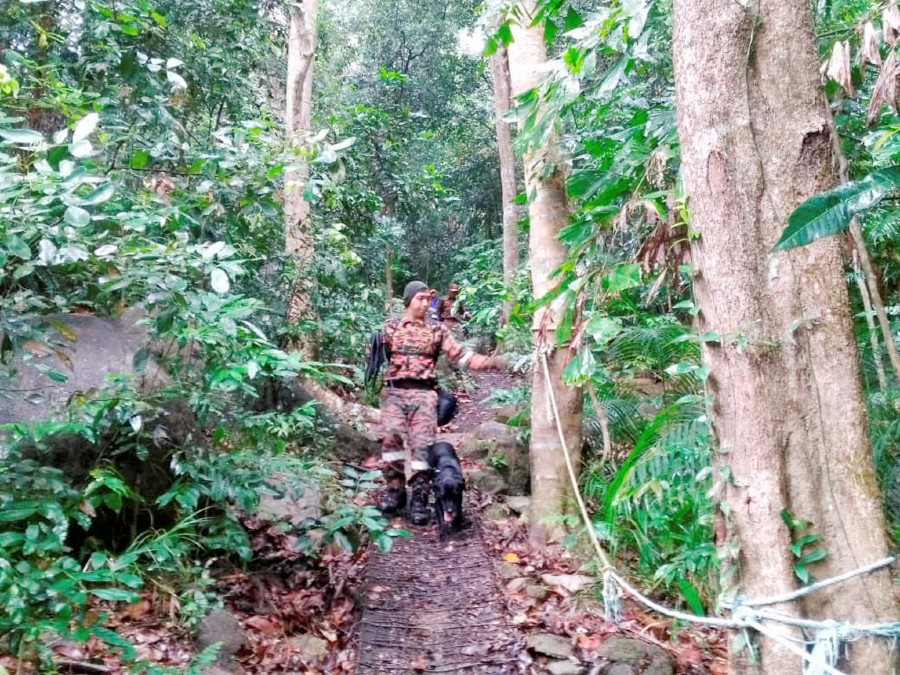TDA joins search for missing Finnish tourist

State Fire and Rescue Department deputy director Mohd Sani Harul said the extra assets would be deployed to cover more areas around the island. Pix courtesy of Fire and Rescue Department
Tioman Development Authority (TDA) has joined the search for a Finnish man, believed to be missing in Pulau Tioman since Tuesday, by providing additional boats for the operation.
State Fire and Rescue Department deputy director Mohd Sani Harul said the extra assets would be deployed to cover more areas around the island.
"The boats will allow the SAR teams to expand the search area and cover certain areas of the island.
"Travelling on a boat will make it easier for us to reach the waterfall at Kampung Asah in Mukut on the island... If we were to go by land, it will take about three days to reach the village," he said in a statement today.
Nikitin Aleksis Elis Valtteri, 20, was reported missing after planning to participate in a recreational activity at the Kampung Asah waterfall in Mukut here last Tuesday.
He had arrived at Kampung Paya in Pulau Tioman on Jan 21 and stayed in one of the villager's home.
The victim's acquaintance, known only as Jamsari, lodged a police report after he failed to meet the victim as promised near the waterfall on Jan 22.
Mohd Sani said SAR team member have yet to obtain any clues on the missing tourist and tracker dogs have been roped in to assist the operation.
He said a total of 21 firemen, 12 police officers and four personnel from the Civil Defence Force are involved in the SAR operation.
~News courtesy of New Straits Times~

Sup Kambing or Sop Kambing is a mutton soup commonly found in Indonesian cuisine and Malaysian cuisine. It is prepared with goat meat, tomato, celery, spring onion, ginger, candlenut and lime leaf, its broth is yellowish in color.
~wikipedia~

A kopitiam or kopi tiam is a traditional coffee shop patronised for meals and beverages, predominantly operated by Chinese proprietors and especially members of the Hainanese community. The word kopi is a Malay/Hokkien term for coffee and tiam is the Hokkien and Hakka term for shop (Chinese : 店).
A common sight in Malaysia and neighbouring Singapore, menus often feature offerings like nasi lemak, boiled eggs, roti bakar, noodle dishes, bread and kuih. The owners of some kopitiam establishments may lease premise space to independent stallholders, who sometimes offer more specialised dishes beyond standard Chinese kopitiam fare.
Typical beverages include Milo, a malted chocolate drink considered iconic to Malaysians of all ages, as well as coffee (kopi) and tea (teh). Diners would use slang terms specific to kopitiam culture to order and customise drinks to their taste.
~wikipedia~
Visa exemption for China tourists extended to Dec 2019
The 15-day visa exemption for tourists from China has been extended from Jan 1 to Dec 31 this year, a piece of good news for local tourism industry players.
With many Chinese nationals going on holiday during the Chinese New Year next month and China’s National Day Golden Week break in October, Malaysia’s tourism association is hopeful that the exemption will boost arrivals.
Home Minister Tan Sri Muhyiddin Yassin on Jan 2 made three separate orders to grant visa exemptions for Chinese and Indian tourists.
The orders granting the exemption under the Passports Act 1966 were published on Jan 3 in the Federal Government Gazette.
The three are: Passports (Exemption of Visa to Tourist Who is Citizen of The People’s Republic Of China) Order 2019; Passports (Exemption of Visa to Tourist Who is Citizen of India) Order 2019; and Passports (Exemption of Visa to Expatriate Who is Citizen of India) Order 2019.
Chinese tourists were first granted the 15-day visa exemptions on Oct 1, 2015, while Indian citizens including expatriates who visit Malaysia as tourists were first given exemptions on April 1, 2017.
The exemptions for both countries were extended every year since.
The exemption for tourists who are citizens of China comes with a number of conditions.
According to the orders, applicants must register with an electronic travel registration and information system provided by the Immigration Department.
They must have a return ticket and must produce on arrival, proof of sufficient pocket money, credit card or bank card with the UnionPay, AliPay or eWallet logo.
They must also produce their itinerary in Malaysia upon arrival.
The orders stated that the 15-day exemption could not be extended, and upon leaving Malaysia, the tourist was only allowed to re-register for exemption again after three months.
The exemption for tourists who are citizens of India has almost similar conditions while the exemption of Indian expatriates applies to all citizens of India working as expatriates outside India in all countries except Singapore.
They are granted the exemption when travelling to Malaysia as tourists.
~News courtesy of The Star~









